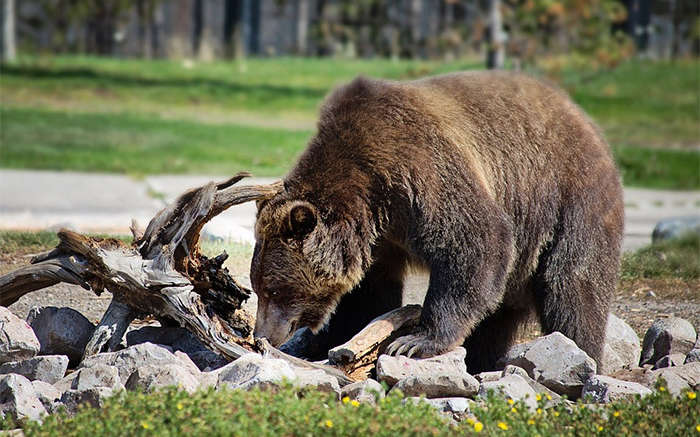Living and hiking in bear country is a blessing, not a curse. Bears, especially the American Grizzly is a symbol of the wild and untamed wilderness and isn’t that the reason we hike and camp? Our passion for the outdoors is deeply rooted in our innate need to connect with our world; to climb to the peak or explore a hidden canyon. It recharges us and fills our souls. Without bears, the wilderness would be, well, less wild.
[the_ad id=”7373″]
The American Grizzly is expanding its territory beyond protected national parks and the dark woods of wilderness boundaries and branching back out into the river valleys and plains across Montana and Wyoming into wheat fields and river bottoms, their historical range. You are now as likely to see a Griz in the sagebrush on the plains as you are to see one in Yellowstone Park. The comeback of the Grizzly is another great American wildlife success story.
As a fishing guide in Yellowstone, I am frequently asked how to avoid a bear attack. I remind people that they are far more likely to be involved in a traffic crash driving to the trailhead than attacked by a bear. For example, in Montana which is perhaps the most dangerous state to drive in, the odds are 1 in 4,400 of dying in an automobile accident. The odds of being attacked by a bear in Yellowstone while camping in the backcountry are 1 in 1.4 million. Still, people worry about what lurks in the dark more than what they see through their windshield.
But, just to be safe, let’s visit some important tips for preventing bear encounters that lead to attacks in the backcountry:
- Make noise. Travel in groups of 3 or more. Bear bells can be purchased at most outdoor sporting goods stores. If you cannot find bells for tomorrow’s hike, take a water bottle and drop some pennies or pebbles in it. Then, tie the capped bottle to your pack and enjoy the rattle it makes as you stroll through the woods. Whether it is a bell or a bottle of rocks, this sound carries through the woods as an unnatural sound that bears may hear before they hear you speak, step or cough. There’s no guarantee they work, but out there, there are no guarantees anyway right? You can sing, but put the headphones away. I’m not kidding. I have seen people hike alone in Grizzly country wearing headphones tuned into their own little world. This is a great way to be mauled while getting on your jam. I think the best way to avoid bears to be bear aware; simply pay attention to your beautiful surroundings and though the trail may get steep, don’t fixate on trudging along, look up and around you often.
- Carry bear spray. Buy the good stuff often priced at $50 per bottle. I know a guy who climbed a tree after being chased, pulled his economy bottle out and pointed it down at the bear and cried when the bottle only dispensed a sneeze of chemical. Very dis-heartening indeed. Firearms provide added safety but only if it is a high enough caliber (.41 magnum or larger in my opinion) and only if you are an expert marksman at striking large carnivores intent on biting you as they travel 30 miles per hour as you are shaking and doing other things in your hiking shorts. Not to mention killing a bear also means an investigation as the species is protected. And none of us want that anyway.
- Many attacks occur when people surprise bears. A bear could be feeding on a carcass and neither of you see each other and he doesn’t smell you. The bear is surprised and perhaps sees you as competition for the food source. Or worse yet, cubs are present. Avoid traveling at night or dusk or dawn. Make extra noise when hiking through dark thick timber anytime but especially during the day when bears may be sleeping there avoiding the heat.
- Don’t Run. The sight of an adult grizzly will make you want to. But, running may trigger the prey drive in a bear. Instead, make noise by talking in a calm voice just for the sake of making noise and back away. Pull the bear spray and flip the safety cap. Be prepared to spray if the bear charges. Have trail mates stand side by side to make you look bigger and back away slowly. A bear will stand to smell the air and try to figure out what you are and if you pose a threat. A bear will clack its teeth and lay back its ears when it is ready to charge and may give a bluff charge. Adios bear! As a last resort, if being attacked, lay on your stomach and cover your neck and back of your head with your hands. And, spread your feet apart to help prevent the bear from rolling you over… Easy stuff to remember when a thousand pound carnivore is biting you, right?
- Use proper food storage techniques as outlined by the U.S. Forest Service and National Park Service.
I talk with people who want to enjoy and explore their wilderness, but are too afraid because of fear of being eaten by bears. The more you explore your natural world the better a steward of the universe you will be. Not to mention the thrill of being in the wilderness. So, yeah a bear can kill you but it probably won’t. So, enjoy the wild that makes the wilderness even if it includes the possibility of a bear encounter, just be wise about doing so. You will be stronger for it.

